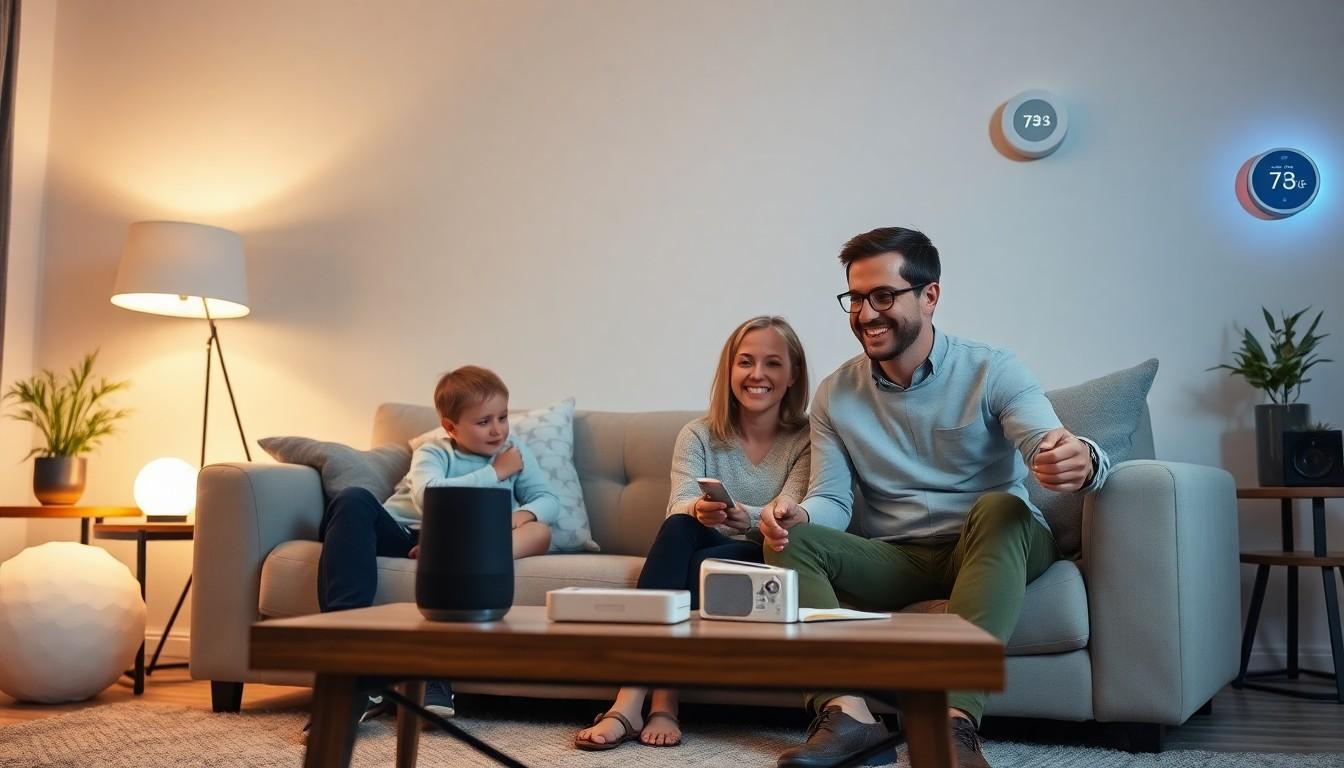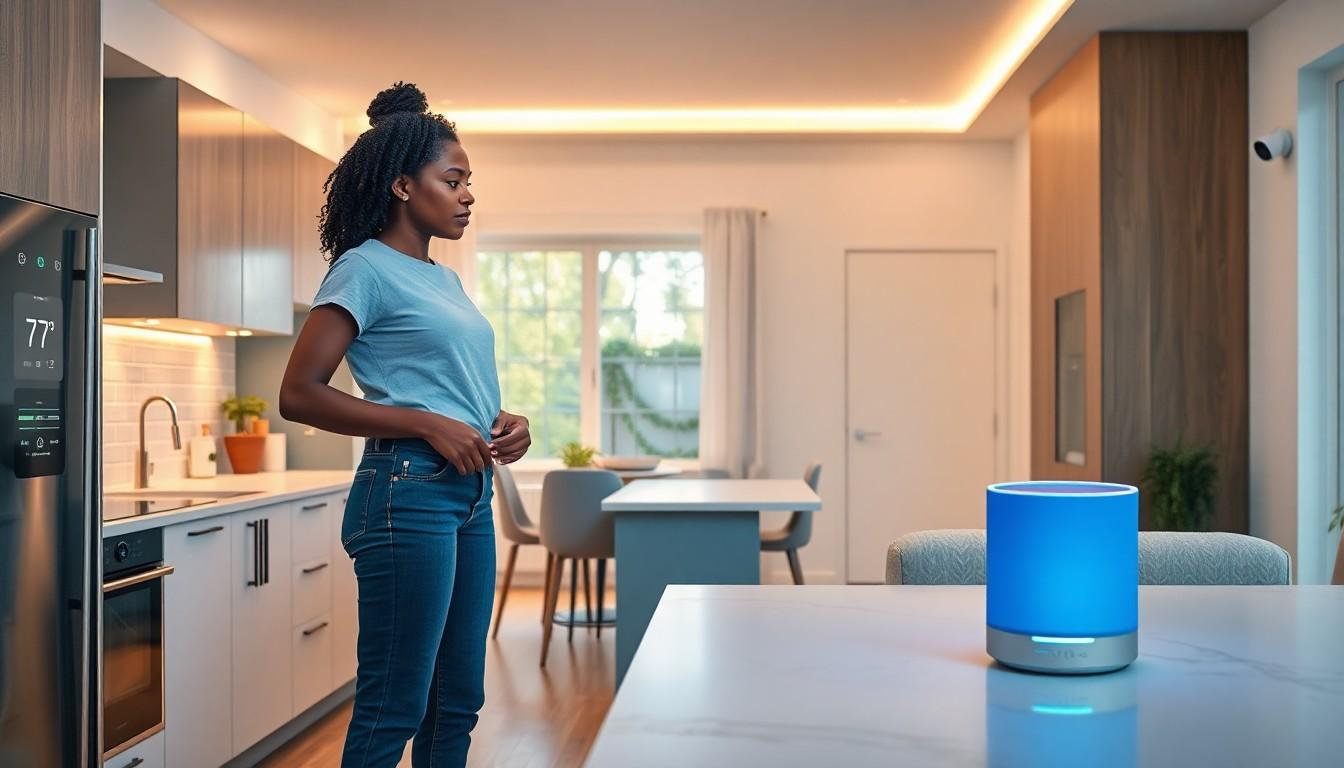Imagine walking into a home that greets you with a warm glow and your favorite playlist. Welcome to the world of smart homes, where technology meets comfort in the most delightful way. As real estate evolves, these tech-savvy abodes are no longer just a futuristic dream; they’re becoming a standard expectation for buyers.
Table of Contents
ToggleOverview of Smart Homes in Real Estate
Smart homes integrate advanced technology with traditional living spaces. Sensors, automation systems, and applications enhance convenience and security, appealing widely to potential buyers. Home automation systems enable users to control lighting, temperature, and security remotely. With increasing interest in energy efficiency, smart homes often feature smart thermostats and energy monitoring systems.
Homebuyers are prioritizing amenities that contribute to sustainability. Smart appliances, such as refrigerators with inventory tracking and ovens with remote access, serve as examples of innovation enhancing everyday life. Integrating these features leads to potential cost savings on utility bills.
Real estate listings now prominently showcase smart home technologies. Market studies indicate that homes equipped with smart features can demand higher prices. Buyers view these features as essentials rather than luxuries, reflecting changing consumer preferences in the housing market.
Technology plays a pivotal role in home management. Smart home devices can communicate with each other and provide data analytics, making residences more efficient and manageable. Enhanced safety features, such as smart locks and surveillance cameras, also contribute to a heightened sense of security.
Adaptations to smart home technology can increase property value. Real estate professionals emphasize the importance of highlighting such features in listings to attract potential buyers. As demand for smart homes rises, developers invest in innovative technologies to meet market expectations.
Benefits of Smart Homes

Smart homes offer a range of advantages that cater to modern living. Key among these are enhanced security features and energy efficiency that can lead to significant cost savings.
Enhanced Security Features
Smart homes integrate advanced security technologies like smart locks and surveillance cameras. These features allow homeowners to monitor their properties remotely, providing peace of mind. Users can receive real-time alerts on suspicious activities, ensuring quicker responses to potential threats. Security systems often include automation that locks doors or turns on lights during unusual hours, creating the impression of occupancy. Data indicating that homes with advanced security features sell faster underscores the importance of these amenities in real estate.
Energy Efficiency and Cost Savings
Energy efficiency is a primary benefit associated with smart home technologies. Smart thermostats optimize heating and cooling, adjusting settings based on usage patterns and occupancy. Homeowners can track energy consumption through smart meters, leading to informed decisions about energy usage. Appliances like smart refrigerators and washing machines use energy more efficiently, reducing utility bills. According to market studies, properties featuring energy-efficient technologies often command higher prices, reflecting buyer interest in sustainable living. Efficient energy use not only lowers costs but also aligns with growing environmental awareness among consumers.
Popular Smart Home Technologies
Smart homes integrate numerous technologies for convenience and security, becoming a standard in real estate. Various devices enhance the living experience, appealing to buyers.
Home Automation Systems
Home automation systems allow homeowners to control multiple elements from a single interface. These systems link devices like lighting, HVAC, and appliances, enabling seamless operation. Users can schedule routines to optimize energy consumption and enhance comfort. For example, a smart thermostat adapts temperature settings based on occupancy patterns, directly reducing utility costs. Enhanced connectivity among devices fosters efficiency and convenience, a priority for modern homeowners. Surveys indicate that features like automated lighting significantly boost a home’s marketability, making them highly sought after among buyers.
Smart Security Devices
Smart security devices enhance home protection with advanced technologies. Products such as smart locks and surveillance cameras offer real-time monitoring accessible via mobile applications. Homeowners enjoy the peace of mind that comes with remote alerts about suspicious activities. For instance, a smart doorbell allows users to see and communicate with visitors, no matter where they are. Research shows that homes featuring robust security options sell faster and at elevated prices. Implementing these devices directly addresses the growing consumer demand for safety and reliability in residential settings.
Market Trends for Smart Homes
Smart homes are rapidly becoming a vital aspect of the real estate market. The integration of technology into living spaces attracts buyers who seek innovative solutions for comfort, security, and efficiency.
Increasing Consumer Demand
Consumer interest in smart home features is consistently rising. Surveys reveal that over 70% of homebuyers prioritize properties with smart technology. Automation and remote control capabilities enhance daily living, making tasks simpler and more efficient. Enhanced security features also play a critical role, with many buyers favoring homes offering smart locks and surveillance systems. Interest in energy efficiency further drives demand for smart appliances that lower utility costs. This trend demonstrates a clear shift in expectations among prospective homeowners, as modern buyers view smart technology as essential rather than optional.
Impact on Property Values
Smart home features significantly influence property values. Research shows that homes equipped with smart technologies fetch prices up to 30% higher compared to those without. Increased safety and energy efficiency contribute to enhanced buyer appeal, making these homes more marketable. Properties with smart thermostats and intelligent lighting systems often sell faster, reflecting growing consumer demand. Listings highlighting smart technologies not only attract more attention but also position homes favorably in competitive markets. Buyers recognize the long-term savings associated with smart home investments, reinforcing their value in today’s real estate landscape.
Challenges in Adopting Smart Home Technologies
Smart home technologies present several challenges for adoption within the real estate market. Addressing these issues is essential for both developers and potential homeowners.
Privacy and Security Concerns
Concerns about privacy and security rank high among potential smart home adopters. Many devices require internet connectivity, which may expose homeowners to breaches. Cybersecurity threats can arise from weak passwords or outdated software. Homeowners often worry about unauthorized access to personal data collected by devices. Consequently, a lack of trust in protecting sensitive information can hinder widespread adoption of smart technologies.
Cost of Implementation
Implementing smart home technologies can present significant costs. Initial expenses for purchasing and installing smart devices often dissuade potential buyers, especially with budgets already stretched. Smart appliances, security systems, and automation setups frequently require substantial investment. Following the purchase, ongoing maintenance and updates also incur additional costs. Buyers, who prioritize affordability, might view these financial commitments as obstacles despite the long-term energy savings and efficiency benefits.
The rise of smart homes in real estate marks a significant shift in buyer expectations. As technology becomes integral to daily living, homes equipped with smart features are no longer just desirable but essential. This trend not only enhances comfort and security but also aligns with the growing demand for energy efficiency.
Real estate professionals must adapt to these evolving preferences to remain competitive. Highlighting smart home technologies in listings can attract more interest and potentially lead to higher sales prices. While challenges like cost and privacy concerns exist, the benefits of smart homes far outweigh these hurdles. Embracing this innovation is key to meeting the needs of today’s discerning buyers.







